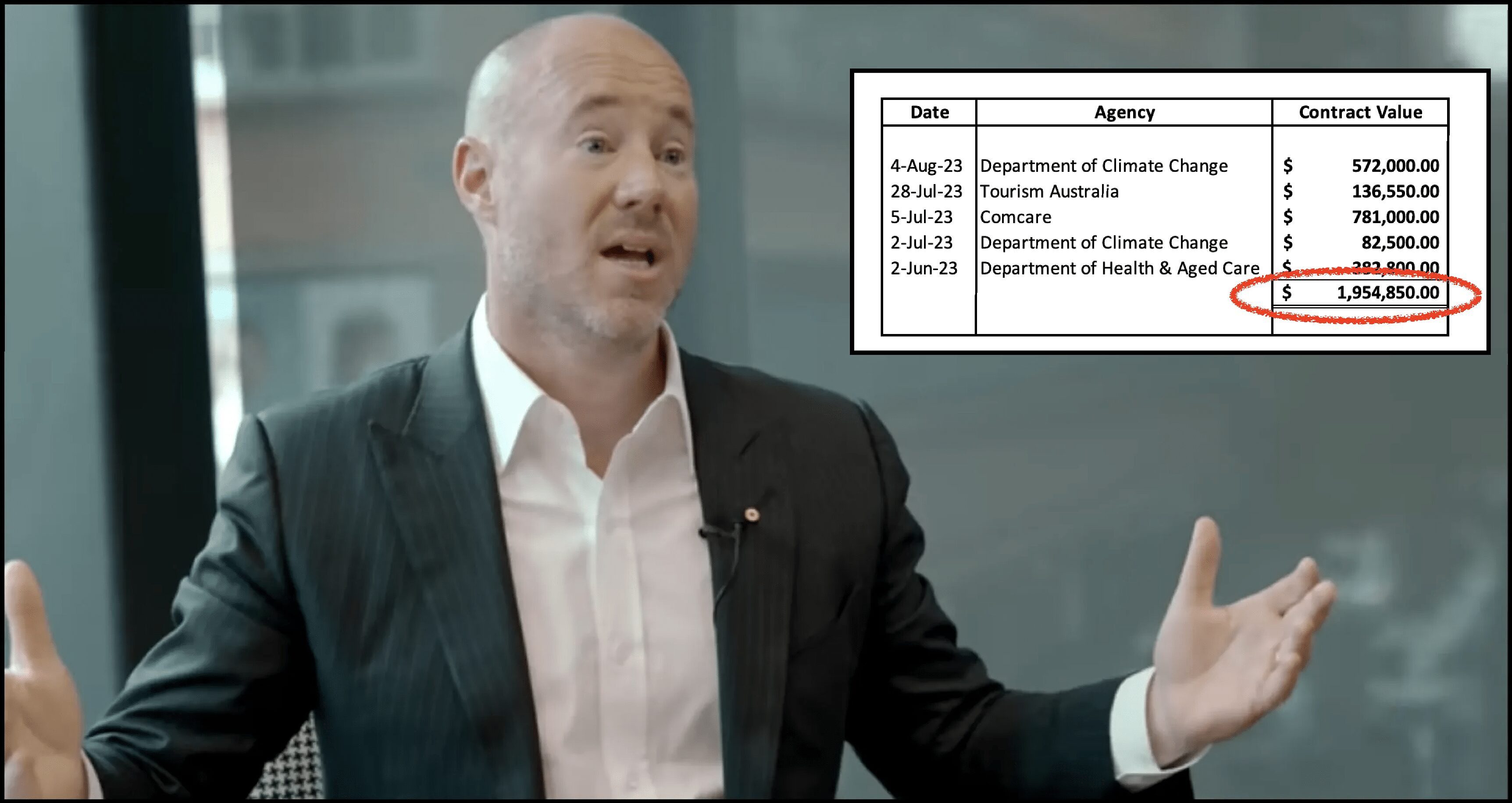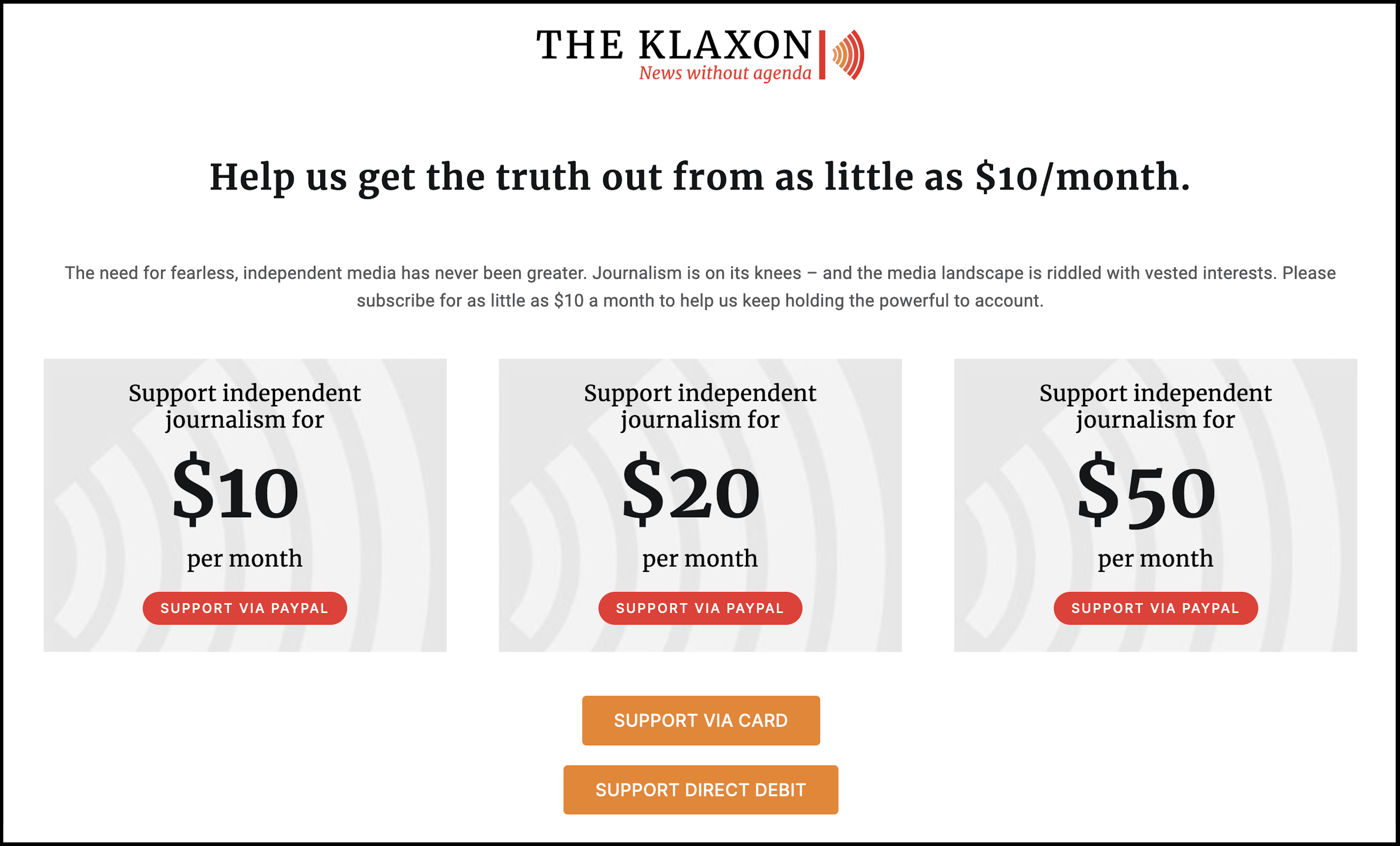Appreciate our quality journalism? Please subscribe here
DONATE
EXCLUSIVE
The private company of the PwC CEO for the entire tax leaks affair has been given millions of dollars in new Federal Government contracts — and is being awarded them at three times the rate it was before the government’s “crackdown” in May.
In the past two months, five new contracts to Luke Sayers’ Sayers Group, totalling $1.955 million, have been reported on Federal Government procurement site AusTender — with the latest just last week.
On August 4 the Department of Climate Change & Energy reported it had given Sayers Group a new $572,000 contract for “management support services”.
That same department started an $82,500 contract with Sayers Group — for “management advisory services” — on May 22, AusTender records show.
On May 30 — almost two weeks after the Department of Finance issued a widely reported “procurement policy” warning — Sayers Group started a $781,000, seven-month, contract with the Federal Government’s workplace safety agency Comcare, for “computer services”.
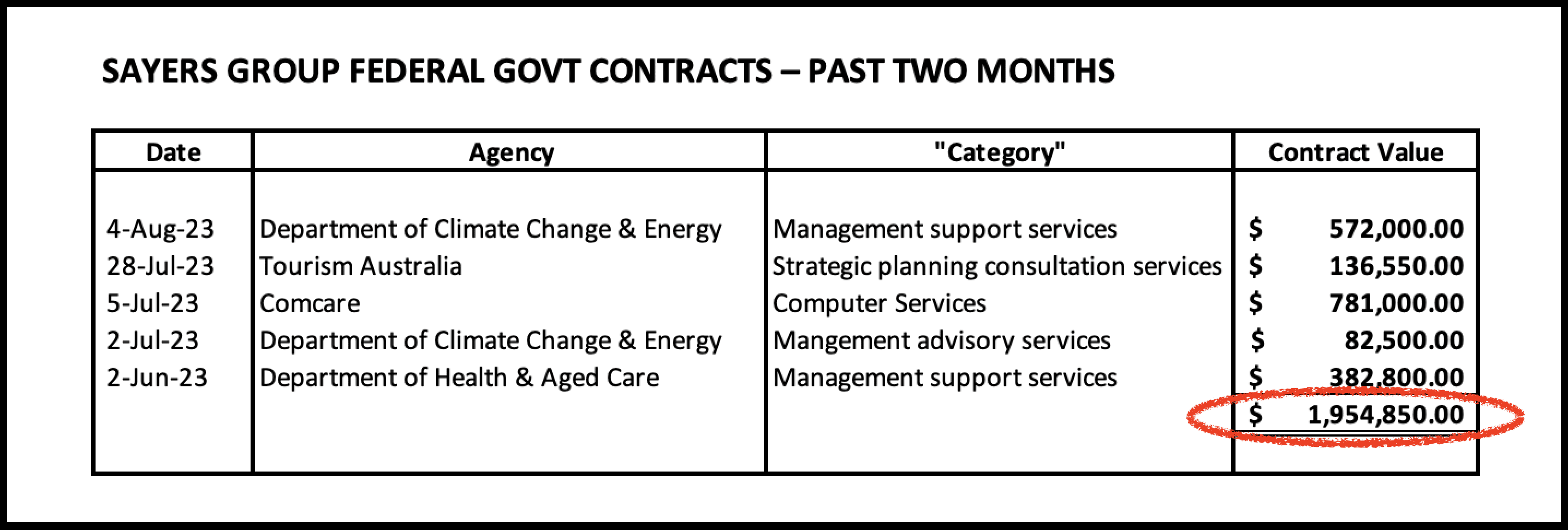
Source: AusTender. Graphic: The Klaxon
On May 26. the Department of Health and Aged Care signed up Sayers Group to $382,800 in new work, for “management support services;, and on July 28 Tourism Australia reported — for the first time — it has engaged Sayers Group for hundreds of thousands of dollars to deliver a “creative pitch”.
That “creative pitch” — now costing taxpayers $495,550 — was awarded with under a “limited tender”, AusTender records show.
Sayers was PWC Australia CEO from 2012 until May 2020, and so boss of the company for the entire period it was illegally sharing and selling Federal Government tax policy secrets, in one of the biggest corporate scandals in Australian history.
Like PwC, Sayers Group, founded by Sayers in 2020, cashes in on government “outsourcing”, making large sums of money providing services previously undertaken by the public service. Sayers Group employs many former PwC partners and staff.
Please support us and SUBSCRIBE HERE
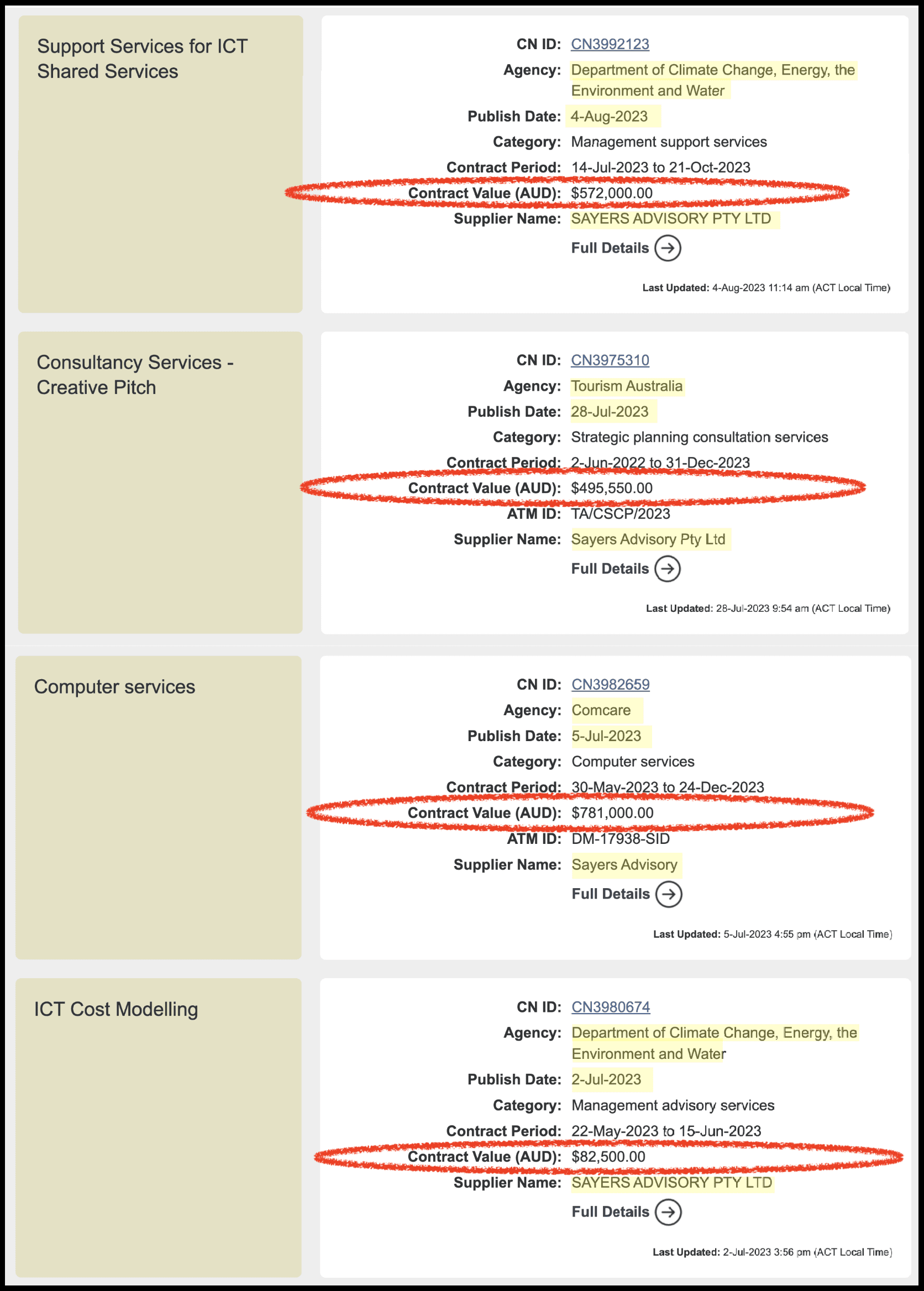
Source: AusTender
On Monday the Australian Taxation Office (ATO) said its second-in-charge, Jeremy Hirschhorn, had in August 2019 told Sayers he should “personally review the internal emails”, with Hirschhorn having at least three meetings with Sayers in 2019 and early 2020.
Internal PwC emails leading up to 2018, between scores of PwC partners and staffers sharing and discussing secret government tax policy data, have been in the hands of Federal Government authorities for several years.
In his first public comments since the scandal broke in January, Sayers in May released a statement that he was “not aware of the confidentiality issues that have since emerged within the international tax practice at PwC”.
In a statement Tuesday, Sayers said he was not aware of “the existence of a confidentiality agreement signed by (then PwC partner) Peter Collins until I read about it in the media this year”.
“I regret that I did not know about the breach of it earlier as I would have taken firm action,” the statement reportedly says.
More Klaxon PwC Tax Scandal Exclusives:
6 Aug – Tax agency’s board meetings held inside PwC
1 Aug — Tax Ombudsman responsible for “missing” report
25 July — PwC’s Peter Collins on Tax Board “Advisory Panel”
23 July — Tax Board run by PwC Partner
18 July — Gov’t “Advisory Panel” of PwC tax partners axed
17 July — First public official ousted in global PwC tax scandal
13 July — Gov’t tax boss at heart of PwC tax scammers nest
27 June — PwC tax scam CEO quits as charity chair
26 June — Tax Ombudsman schooled by PwC emails partner
7 June — “Vanished” Tax boss was exec at pre-PwC
24 May — You don’t Sayers? PwC Mini-Me in $6m Gov’t bonanza
The scandal erupted on May 2 when the Senate into consultancies published a heavily redacted, 144-page cache of internal PwC emails from 2013 to 2018.
On May 19 the Department of Finance issued a “procurement policy note”, which has been reported as an “effective ban” on PwC from new Federal Government contracts.
“Officials must consider, among other things, a potential supplier’s relevant experience and performance history when assessing value for money,” it states.
“This could include consideration of any unethical behaviour and/or deficiencies in performance under prior contracts…including failure of the tenderer to abide by substantive requirements such as confidentiality provisions
“Dishonest, unethical or unsafe supplier practices may include tax avoidance, fraud, corruption, exploitation, unmanaged conflicts of interest,” it states.
The document states: “Officials must factor these matters into the evaluation of tenderers, ensuring any decisions are documented as appropriate”.
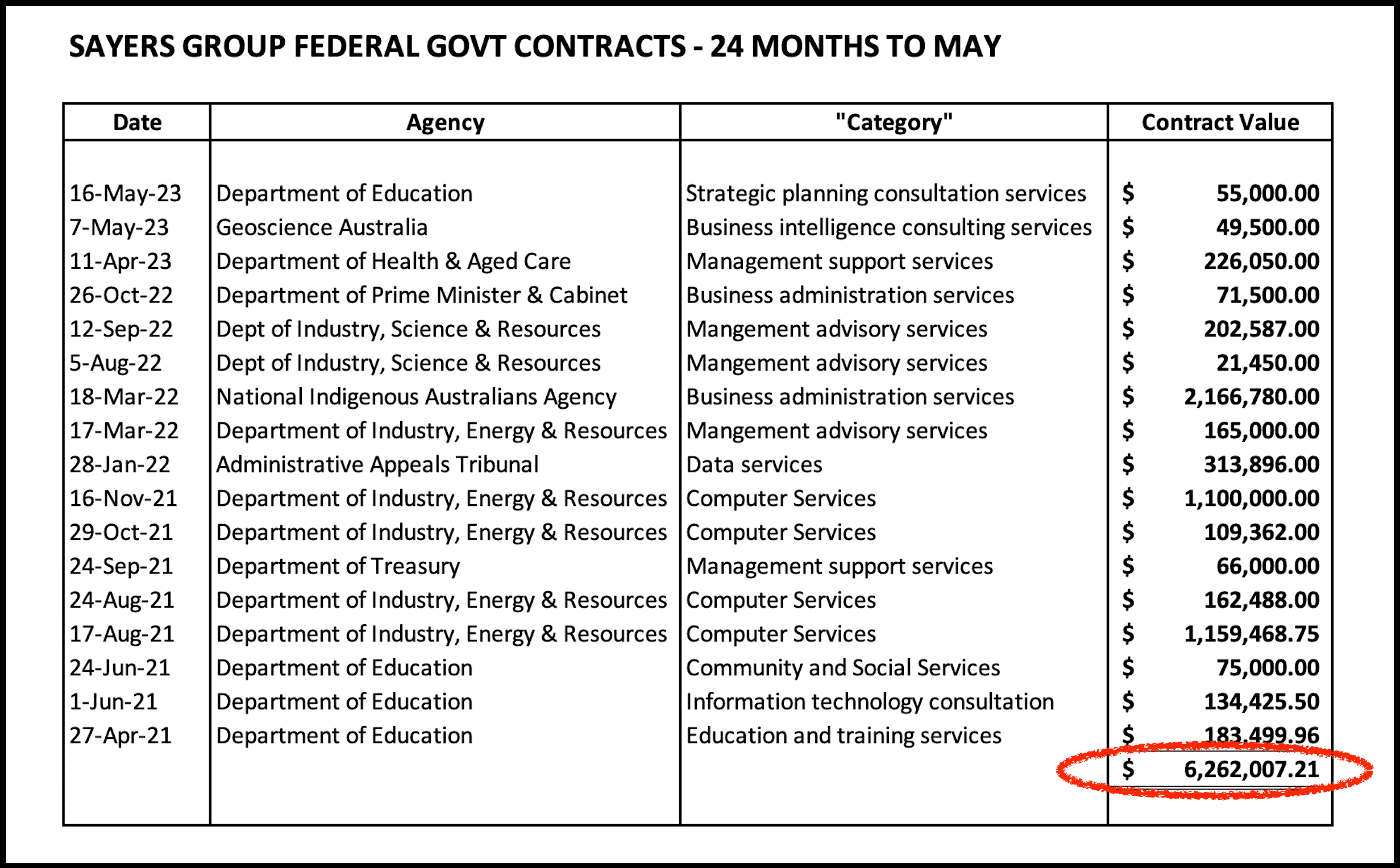
Source: AusTender. Graphic: The Klaxon
On May 24 The Klaxon revealed Sayers Group had been given $6.262m in Federal Government contracts in the preceding two years.
Since then, a further five Sayers Group contracts totalling $1.955m have been published on AusTender.
Government agencies are required to report contracts within 42 days (six weeks) and there is usually a lag between a contract being awarded and it being reported on AusTender.
AusTender disclosures state the day they were “published” on the site, as well as when the contract commenced.
Since May 22 Sayers Group has started four new contracts worth $1.572m.
That’s more than three times the rate of the $6.262m awarded in the 24 months to May 22.
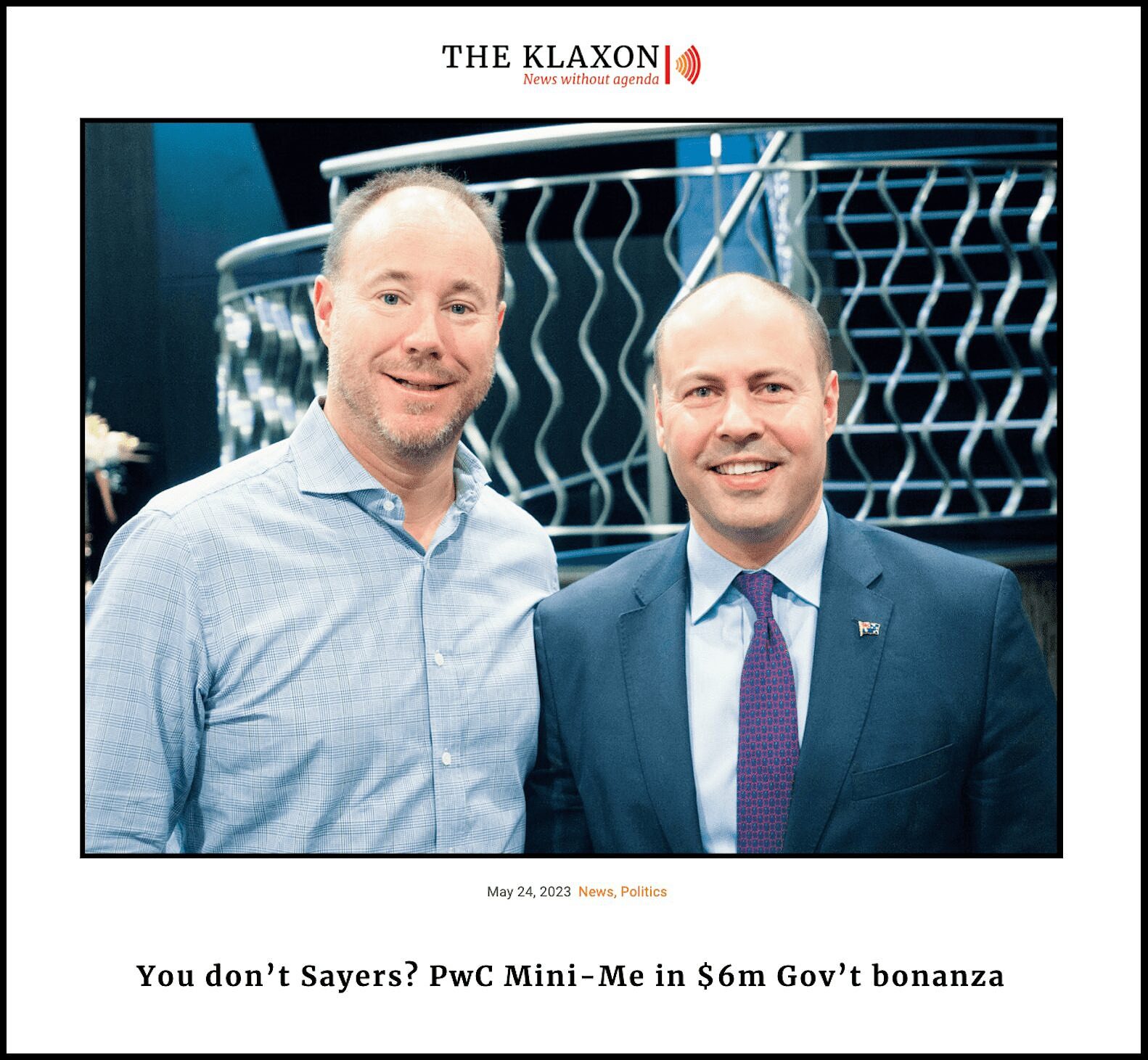
The Klaxon’s May 24 report. Source: The Klaxon
The rate at which new contracts are being awarded to Sayers Group could be even higher — the six-week lag means there could me more contracts awarded but not yet reported.
AusTender also does not capture contracts below a certain value.
The threshold for government departments is $10,000 while the threshold for “corporate Commonwealth entities” — despite them being subject to fewer government controls and accountability safeguards –– is $400,000.
That difference is why Sayers Group’s $495,550 “creative pitch” to Tourism Australia — a “corporate Commonwealth entity” — was only reported for the first time two weeks ago, despite it starting over a year ago.
Please support us and SUBSCRIBE HERE
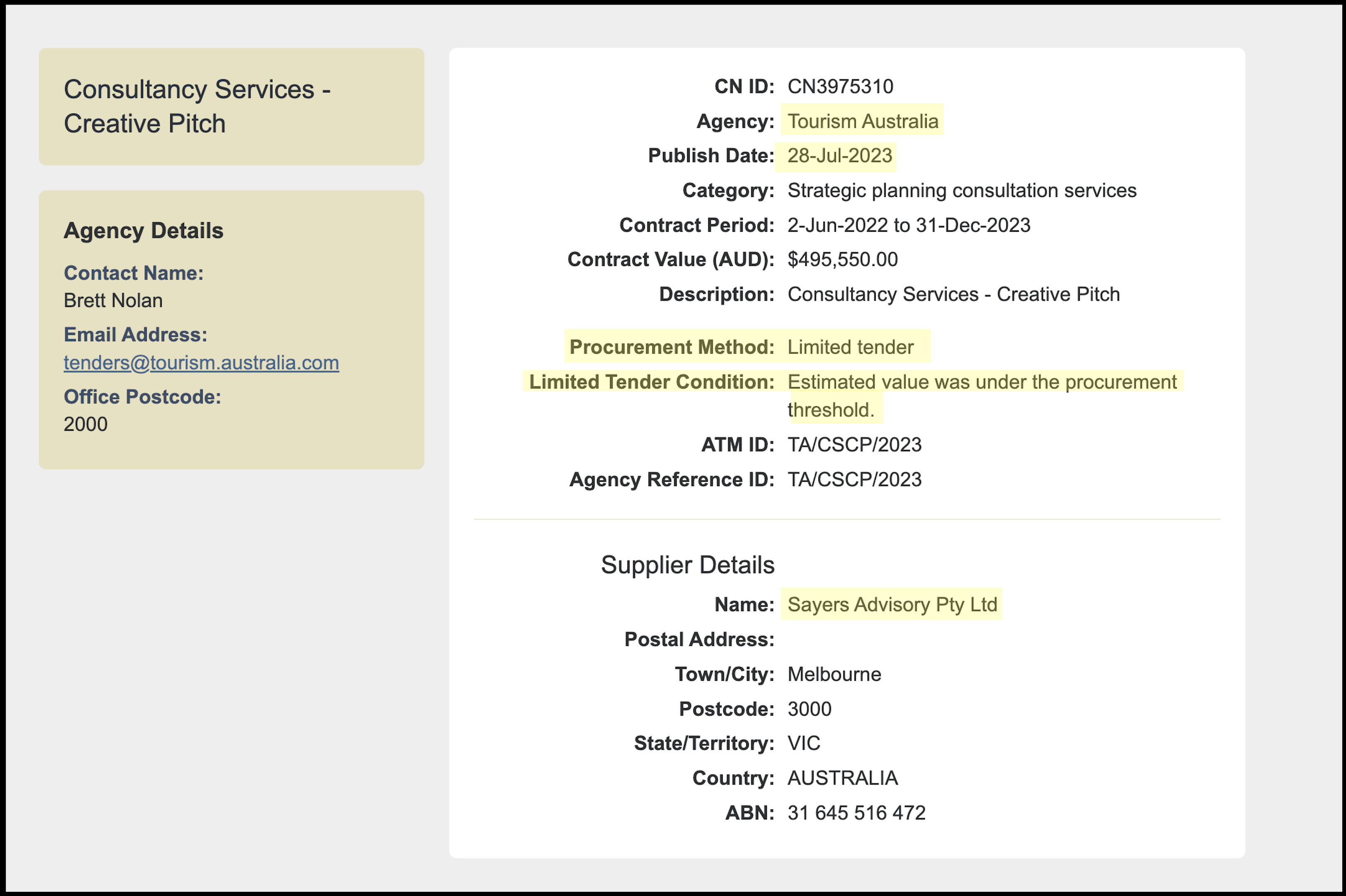
The Sayers Group’s $495,550 “Creative Pitch”. Source: AusTender
The July 28 disclosure states the “contract period” started on June 2 last year, and The Klaxon is told the initial contract was for $359,000 — and so under the $400,000 AusTender threshold.
“The most recent notice on AusTender (28 July 2023) was published after a variation to the contract increased its value above the appropriate reporting threshold for corporate Commonwealth entities ($400,000),” said Tourism Australia spokeswoman Kim Moore.
“The notice was published within the timeframes required under the Commonwealth Procurement Rules”.
Although AusTender refers to “amended” contracts, any amended contract is a new contract.
The disclosure published on July 28 states the Tourism Australia contract was for “consultancy services — creative pitch”.
The “contract value” is stated as $495,550 (if the original contract was for $359,000 the new Sayers Group contract was for $136,550).
AusTender contains extremely limited information as to what contracts are being awarded for.
Tourism Australia declined to say what the contract was specifically for.
The July 28 document states: “procurement method: limited tender” and “estimated value was under the procurement threshold”.
The “contract period” now runs until December 31.
On June 2 a contract between the Department of Health and Aged Care and Sayers Group for “management support services — shared service optimisation” was published on AusTender.
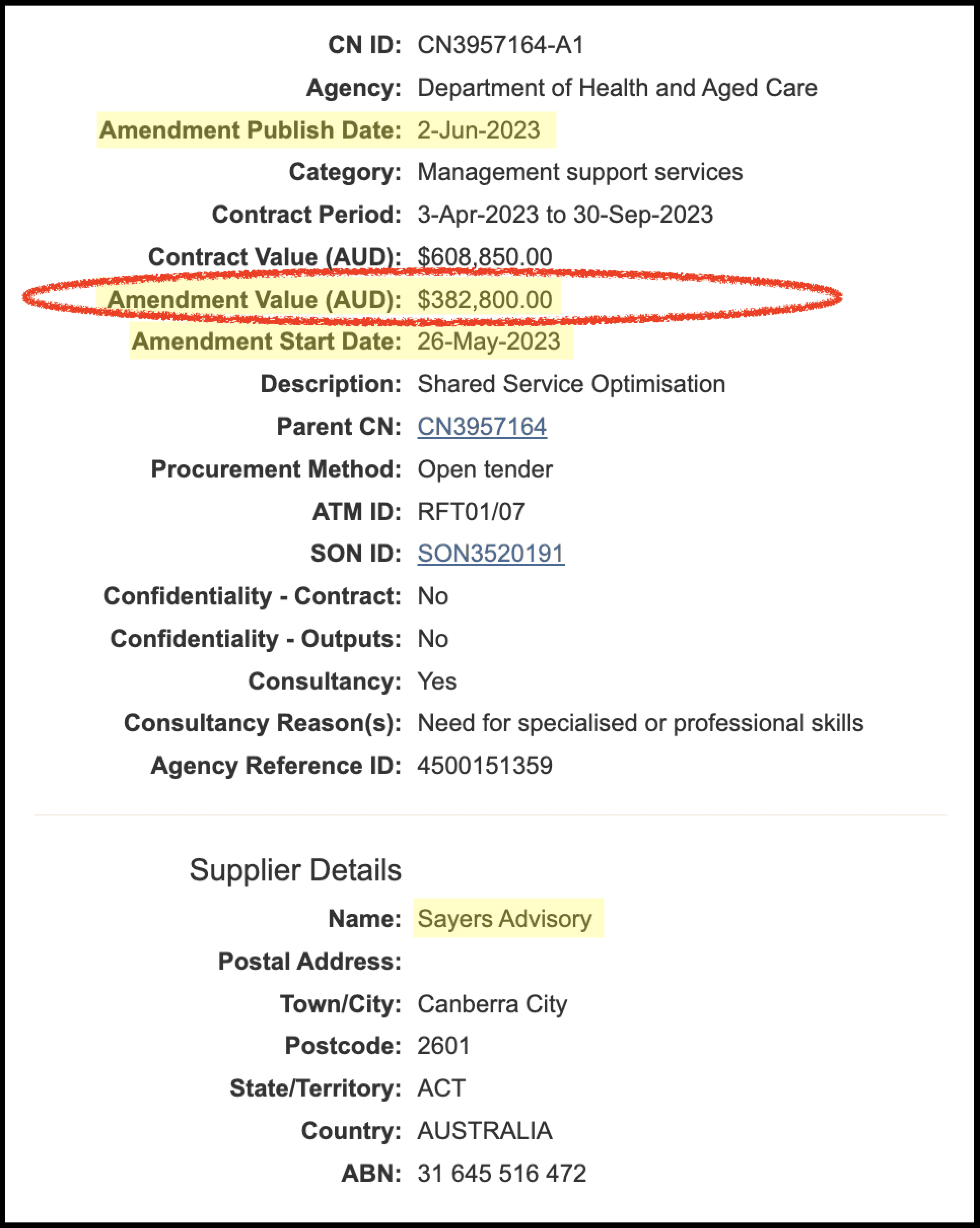
It states: “contract value: $608,850” and “amendment value: $382,800”, meaning the total price has more than doubled, from $226,050.
When an “amendment” is published, the original disclosure in AusTender is altered, with the original contract end date removed.
The “contract period” is now stated as “3 April 2023 to 30 September 2023”.
In February the Australian National Audit Office (ANAO) reported that over the past decade, $565 billion had been spent on contracts, “one-third” of which was “committed through amendments”.
In 2012-13 the “value of contract amendments to existing contracts” was $4 billion — in 2020-21 it was $28 billion.
“Once they get in, then they expand their reach through familiarity” – Senator Deborah O’Neill
In an ABC Four Corners expose Monday, ALP Senator Deborah O’Neill, running the Senate inquiry into consultancies, said there were concerns of many consultancies operating a “land and expand model”.
“Once they get in, then they expand their reach through familiarity,” O’Neill said.
The whole business model of these companies is billable hours. The longer they stay there, the less efficiently they do the job”.
BEFORE YOU GO! Help us stay afloat and telling these stories. Please SUBSCRIBE HERE or support us by making a DONATION. Thank you!
BEFORE YOU GO! Help us stay afloat and telling these stories. Please SUBSCRIBE HERE or support us by making a DONATION. Thank you!
Anthony Klan
Editor, The Klaxon
Help us get the truth out from as little as $10/month.
Unleash the excitement of playing your favorite casino games from the comfort of your own home or on the go. With real money online casinos in South Africa, the possibilities are endless. Whether you’re into classic slots, progressive jackpots, or live dealer games, you’ll find it all at your fingertips. Join the millions of players enjoying the thrill of real money gambling and see if today is your lucky day!
The need for fearless, independent media has never been greater. Journalism is on its knees – and the media landscape is riddled with vested interests. Please consider subscribing for as little as $10 a month to help us keep holding the powerful to account.


